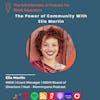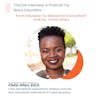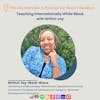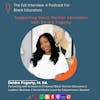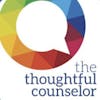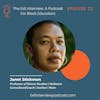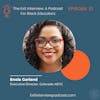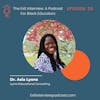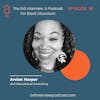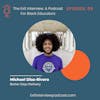
Episode 32: Hope for Our Education System with Lacey Robinson
In this enlightening episode of The Exit Interview podcast, co-hosts Dr. Asia Lyons and Kevin Adams welcome guest Lacey Robinson, president and CEO of UnboundEd. Lacey shares her profound experiences and insights on the education system, particularly focusing on Brown and Black students. Starting as a struggling reader who transformed into a strengthened one, Lacey discusses her journey towards becoming an educator, school leader, and now the head of an organization that centers around equity in education. She recounts her tenure as a turnaround principal, which she identifies as a life-altering period that led her to question her beliefs and tactics in managing a school. Lacey advocates for creating a non-oppressive, high-expectation, fully supportive learning environment where Brown and Black students can thrive. Furthermore, she highlights the power of educators' freedom, alongside the need for systemic reform to recruit and retain black educators. Delving into her current work at UnboundEd, she shares the organization's various programs geared towards fostering fairness and transformation in instruction for marginalized students. The episode concludes on a hopeful note, with each participant sharing what brings them joy.

In this enlightening episode of The Exit Interview podcast, co-hosts Dr. Asia Lyons and Kevin Adams welcome guest Lacey Robinson, president and CEO of UnboundEd. Lacey shares her profound experiences and insights on the education system, particularly focusing on Brown and Black students. Starting as a struggling reader who transformed into a strengthened one, Lacey discusses her journey towards becoming an educator, school leader, and now the head of an organization that centers around equity in education. She recounts her tenure as a turnaround principal, which she identifies as a life-altering period that led her to question her beliefs and tactics in managing a school. Lacey advocates for creating a non-oppressive, high-expectation, fully supportive learning environment where Brown and Black students can thrive. Furthermore, she highlights the power of educators' freedom, alongside the need for systemic reform to recruit and retain black educators. Delving into her current work at UnboundEd, she shares the organization's various programs geared towards fostering fairness and transformation in instruction for marginalized students. The episode concludes on a hopeful note, with each participant sharing what brings them joy.
First of all.... have you signed up for our newsletter, Black Educators, Be Well? Why wait?
Amidst all the conversations about recruiting Black educators, where are the discussions about retention? The Exit Interview podcast was created to elevate the stories of Black educators who have been pushed out of the classroom and central office while experiencing racism-related stress and racial battle fatigue.
The Exit Interview Podcast is for current and former Black educators. It is also for school districts, teachers' unions, families, and others interested in better understanding the challenges of retaining Black people in education.
Please enjoy the episode.
Peace out,
Dr. Asia Lyons and Kevin Adams
Hope for Our Education System with Lacey Robinson
Lacey Robinson: [00:00:00] It made me question my own assumptions I made about us as learners. It made me question and really examine what we were offering students, particularly Brown and Black students in public education. And it made me question the all around belief that is held about Brown and Black students. Starting with myself.
Dr. Asia Lyons: Amidst all of the conversation about recruiting Black educators, where are the discussions about retention? The Exit Interview podcast was created to elevate the stories of Black teachers, professors, counselors, social workers, and administrators who have been pushed out of the traditional education space.
My co host, Kevin Adams, and me, Dr. Asia Lyons, are on a mission with our guests to inform school districts, teachers unions, families, students, educators, and [00:01:00] others. Interested in understanding the challenges of retaining Black people in education. Welcome to The Exit Interview, a podcast for Black educators.
And welcome back, everybody. It's going to be a fire episode, Kevin. What do you think?
Kevin Adams: alWays,
Dr. Asia Lyons: always. Welcome back for a fire episode of The Exit Interview, a podcast for Black educators. It's me, Dr. Asia, and Kevin. Kevin
Kevin Adams: Adams. Sorry. I have something weird going on. Trying to figure that out. Had a lot of technology issues so
Dr. Asia Lyons: far.
Yeah. Listen, the technology is real. We've accepted it. We're going to, we might have dogs barking. We might have birds chirping. Because my bird is somewhere around and that's just a part of it. But we're excited and we're here with Lacey Robinson. Thank you for coming on our
Lacey Robinson: show. LACEY ROBINSON thank you for having me.
TANIA RAY Yeah, of
Dr. Asia Lyons: course. And I'm going to start by reading your incredible bio, [00:02:00] just so that our audience knows who you are. I was talking to one of my good friends, Arvian, about you. She's Oh my God, I know who that is. So she was super excited. So she'll be, I'm sure, the first listener on this episode.
Lacey Robinson is the president and CEO of Unbound Ed. I'm pronouncing that correctly. Yes. And the chair of the Board of Core Learning. As CEO, Robinson sets the organization's vision for transforming instruction for students at the margins. She is a former teacher, principal, and professional development specialist who has focused on literacy, equity, and school leadership for more than 25 years.
Her life's work aims to enable educators to disrupt systemic inequities in their school districts and classrooms. As CEO of UnboundEd, Robinson is responsible for overseeing UnboundEd's health, sustainability, and vision for engaging, affirming, and meaningful grade level teaching can transform teachers experiences and students [00:03:00] learning.
In 2022, she also led the merger of UnboundEd, Pivot Learning, and Core Learning under the UnboundEd banner. Creating the nation's largest K 12 educator development organization focused on improving teaching and learning for underserved students. Robinson is a leading national voice on disrupting the predictability of students educational outcomes.
It was named 2023's Forbes 50 over 50 list in recognition of her innovative leadership. Her new book, Justice Seekers, Pursuing Equity in the Details of Teaching and Learning was released in July 2023, is a love letter to teachers, inspiring us all to recognize that justice is found in the details of teaching and learning.
She frequently serves as a keynote speaker and is featured on Emily Hanford's 2022 Soul the Story podcast. She is a proud graduate of Florida A& M University and Teachers College, Columbia University. Welcome to the podcast.
Lacey Robinson: Thank [00:04:00] you. Boy. You want to feel old, have somebody read your bio. Listen!
Dr. Asia Lyons: I'm getting there now.
I'm getting there. It's getting longer and longer. Yeah, and I read it. I was reading it earlier and I was thinking 50 over 50. I can get there. I'm going to do that. I'm
Lacey Robinson: going to do that. Oh yeah. Oh yeah. This is. Not what people think it is 50 over 50, but I'm always forever, like 25, 30 in my head. I
Dr. Asia Lyons: guess.
Kevin Adams: Yeah, there we go. There we go. Yeah.
Dr. Asia Lyons: Same. A hundred percent. Same. I was sitting at my daughter's softball game yesterday and I was thinking, I know how old I am and I also know how old I feel and I can see.
Lacey Robinson: Yeah, that's just. Yeah. And I think I know this to be true. 50 is. The mountaintop, when you're a first year teacher or you're like just starting your profession Or even just embarking on life on your own right and you think 50 so far away And yes, you're climbing you're trying to reach that mountaintop, [00:05:00] right What people don't tell you is that you actually don't get close to the mountaintop till you're around 50.
And some people get there earlier, but trust me, even when they get there earlier, they're forging a new trail to go up to it. And so anyway, I know that's not what the podcast is about, but a lot of people didn't reach their greatness until they were 50. Yeah,
Dr. Asia Lyons: that's so true. That's so true. My mom used to say all the time.
You can go ahead and marry me, marry a man when you turn 52. That's about the age. And I'm like,
Lacey Robinson: I love it. What?
Dr. Asia Lyons: That's it. Yeah. Yeah. It's, he is getting it. Kevin's letting us know. He's that makes sense. Yeah. We're here, the exit interview, obviously we're going to talk about your book, Justice Seekers, Pursuing Equity in the Details of Teaching and Learning.
Yes. That you've written and published. And as a side note, before we get into this, Like a little story, I remember [00:06:00] I follow you on LinkedIn and I remember just seeing you go to the warehouse and open the box. And I was like that, and I'm liking it that's so awesome. This is before I was, before your people asked can she come to the podcast?
So I'm like, good for her. That's so great. And then I fast forward and I'm like, Oh my God, we're going to talk about the book on the podcast. So the small world, because I just think I imagined how that felt. And we'll, I'm sure we'll talk about that. It was, we get into the questions of what are you doing now?
Yeah. I can only imagine that it's a huge stack of boxes full of books. And that feeling to see
Lacey Robinson: it. Yeah, no, it was a moment. A reason why I'm looking down is because I'm pulling out. I'm gonna show you the next moment I had just two days ago with my mother. We can talk about that later, but it was a moment, especially as a...
avid reader, a lover of words, a struggling reader who then became a strengthened reader. It's something to see your name on the title of a book [00:07:00] and and more importantly to for people to hear your thoughts that have been in your head.
Kevin Adams: Yes.
Dr. Asia Lyons: Yeah. Let's get into it. First question we always ask folks is, tell us about your education journey.
How did you end up becoming
Lacey Robinson: an educator? Thank You know what I tell people? It was a lot of God, grace, happenstances, how I became an educator, because, let me tell it what I was probably in my secondary track. I either wanted to be a weather woman. Oh, I wanted to be a newscaster or journalist, really a newscaster.
I wanted to be like a weather woman, then move up to a newscaster. And then I was like if I can't do that, I think I want to be an actress. Now this is hilarious because I never participated in drama or anything in high school. I played an instrument. I was a band geek, but I knew that I wanted storytelling to be a part of my track.
And I knew I was going to write books, right? Like I felt that in my bones and my mother [00:08:00] in high school, I was thinking about this the other day in high school, I lived a dual life. Like I was in AP and honors. ELA and humanities and world history and anything that had to do with the language arts, I soared in.
But honey, math, I could not. I spent my entire secondary career in Algebra 1 and didn't find out why until I got to college. And so when I graduated from high school, I had a 1. 79 GPA and got into Florida A& M, thank God, by the grace of God, and found out I had actually dyscalculia, had teachers and my mother kept saying, I think you should be an educator.
That is your thing. I watched what you've done as a child. And so I chose the track one, because my mother was like, you're not about to be an actress. You're not,[00:09:00]
she's I want you to have a 401k. I
Dr. Asia Lyons: want you to have a mom. God bless moms out there, right? That's right. It's not for everybody.
Lacey Robinson: It's not for everybody. And it was a bunch of happenstances, how I ended up at Marva Collins, how I fell in love with teaching. And so one of the things I tell a lot of young educators.
is trust your instincts and lean into where people may be pushing you because they may see something in you that you don't see in yourself. Yeah. So that's, Florida A& M, then Marva Collins, then Teacher's College, because I was following my best friends to New York City. And I needed an excuse of like why I was moving to New York.
And my best friend was like, you should apply to Columbia. And I was like, Columbia? She's Teacher's College. I had never even known there were teacher colleges. Yeah,
Dr. Asia Lyons: yeah,
Lacey Robinson: that's just wasn't part of our conversation in the teacher lounge. You know what I [00:10:00] mean? And started working for Lucy Coggins.
Honestly, she offered me a job and when I found out that it paid your tuition, I was like honey, you would have asked me to mop the floors. I would have mopped the floors if you paid for my tuition at Columbia. Oh yeah. So a lot of happenstances, a lot of God driven happenstances. That's how I became an educator.
Okay.
Dr. Asia Lyons: Awesome. We love that. Yeah, we do.
Kevin Adams: I think that's common. What we've heard is that people, Black educators, there's some sort of like calling or somehow it's not like the traditional path of I was going to do this. It's a lot of somehow someone got me into it. And I love that advice for young educators to.
Trust in those people that are pushing you places, because I think that is something important for educators to know. Yeah.
Lacey Robinson: Yeah. I say being a teacher, honestly, being an educator, I've thought a lot about this recently. I feel like it's in our [00:11:00] DNA. As black educators, when you think about the type of community that we hail from, that our DNA is from the African diaspora, teaching is a part of the culture, right?
Yep. It's a part of our culture. You have teachers in your lives that weren't certified educators that didn't work in schoolhouses and yet you were taught along the way and I'm literally mean showing you, guiding you, using story, using trial and error. And I just think it's a part of our DNA.
And I think that There needs to be not just the adaptive pushing, but there has to be technical tactics out now to draw us into this profession. And we could talk about that much later, but that's one of the first things I also try to let a lot of people know is that it's in our roots to be educators.
And you just have to tap into it. You have to tap into it.
Dr. Asia Lyons: Yeah, I love that. You [00:12:00] talk about Marva Collins in the book. So can you talk to us and our audience about that experience working at that
Lacey Robinson: school? Yeah, it was happenstance. First of all, before I got to Florida A& M, my aunt had gone to hear Marva Collins speak.
at a business association meeting. And so I remember the movie as a kid, like sitting, I think it was like an ABC family night movie and like watching, the whole story, just fruition on the television about her and her kids and what she did. And then years later, my aunt getting a book signed by her.
And bringing it to me probably like around my senior year of high school. And so again, I say that it was like planted in my path that I would happen upon her while I was at Florida A& M. My best friend had actually gone. to do her internship at the Marva Collins Preparatory School in Cabrini Green, which is no longer [00:13:00] in existence anymore, in Chicago.
And when she went to do it, I just thought that was like the most awe inspiring thing, and she came back and she talked about how liberating it was, but the amount of work, like how hard it was. I then, when it came time for me to do my internship, Florida A& M, HBCU, they push you to jump higher, to explore more.
And part of their residency program, they didn't want you just to do your residency in Florida. They wanted you to seek residencies in different communities, in different regions. I have friends that went to Germany to do their residency. So Applying to the Marva Collins Preparatory School in Ohio brought me back to my roots.
I got an opportunity to live with my sister again, because she was in Cincinnati, and it gave me the opportunity to be in an environment where, honestly, it was the first time in my life That I had seen [00:14:00] Black joy as the center of learning. That I had seen the level of expectation that I had only felt first by my family.
And very few and far in between before I got to FAMU in my K 12 educational track. I had never seen it concentrated like that. I say, I talk about this in Justice Seekers, but like walking into my first day of residency into a second, third grade combined classroom where the students were reading Animal Farm, like I stepped out in the hallway and busted out in tears because I had never seen that level of learning and expectations.
And just excitement and joy and hard work, all world rolled up into one in a school day. And I spent my residency there and it kicked my butt. Yeah.
Dr. Asia Lyons: That's so awesome.
Lacey Robinson: Yeah, it [00:15:00] didn't just kick my butt as an educator, but it kicked my butt as a young Black woman. Who had not been in that kind of environment, it made me question my own assumptions I made about us as learners.
It made me question and really examine what we were offering students, particularly brown and black students in public education. And it made me question the all around belief that is hailed about brown and black students starting with myself and then the system. Yeah, .
Kevin Adams: That's powerful. That's powerful.
Yeah, it is. And to be able to experience an environment like that, to see what is possible early on in your career and practice. Is profound and has a profound impact. So Lacey, it sounds like you were having a wonderful experience, like in your residency. Tell us more about [00:16:00] your teaching career your time in the classroom and subsequently what caused you to move on from the classroom?
Lacey Robinson: Again, by the time I graduated from Florida A& M, I, the teaching bug had been lit in me. It was my passion. It was my purpose. I found a lot of joy in it. I really loved early childhood education, probably because deep down inside, I had wanted to become a pediatrician, but I was told in high school that there was no way I would ever be able to become a doctor because my math wasn't on par, which is totally not true, but that's a whole other subject.
I started my career in Marietta, Georgia. at a predominantly brown and black school. We call these schools urban schools, but the truth is, it sat in a suburban area. And most suburban areas have low income, middle income, high income sections. My students hailed from, I would say, the low to middle income.
But if they were brown and [00:17:00] black, I kid about this, but it's the honest to God truth. If they were brown and black, And if they had some sort of implication, they were at my elementary school. I didn't find this out until many years later, how at that time the district was divided up. And so I started, I launched my career there teaching first grade.
I still remember my first group of kids and I did things that came natural to me. If a first grade girl walked into my classroom and her hair, was all over her head and honey, I went to my desk, I had a brush, I pulled the brush out, I combed her hair, I put barrettes in it, I made sure that my kids felt and looked their best.
I made sure that everything I learned at Marva Collins, from using my own cultural inferencing, to using their cultural inferencing, to having high expectations, everything I learned about those essential components. That are named in the science of reading that is essential for a reader, for someone to gain [00:18:00] in order to grow in their literacy, I push that even without the proper material.
Yeah. And that first year, it whipped me into shape, and I will tell you, while I got joy on the inside of the classroom, I was met with a lot of strife, a lot of disciplinary action in terms of, I wasn't following along with the program, a lot of, would you just fall in line, and go along with the rest of the teachers in your group.
And I just so happened at that time, again, a God, I saw, called a God stance. She's now my best friend. I just so happened to be hired. On the same team as a friend of mine who went to Florida A& M. Oh, wow. He was a Black teacher and we were the only two Black teachers on that first grade team. It was about six of us.
And so that launched me. I went on to, as I said, moved to New York. I became a professional developer. I'd never even known [00:19:00] of the professional development world until I started teaching in New York and quickly realized that I not only loved teaching children, but I actually loved teaching. in the education profession because it made me study my pedagogy.
So I've been a first grade, second grade, kindergarten, pre K, fifth grade teacher. I've been a professional developer in a school system. I've been a turnaround principal for middle school, and now I'm a CEO and president. Of Unbounded and Core. So it's been a long track.
Dr. Asia Lyons: Yeah, that's, it's interesting you talk about having your friend be in that same space with you and met with this pushback of why can't you be like everyone else?
And it's interesting them saying that I'm thinking about you got to be in a space in your internship time. Where this excellence, you had a foundation and so trying
Lacey Robinson: to push and
Dr. Asia Lyons: beat that after you [00:20:00] left and constantly seek, I'm assuming, constantly seeking that and pushing that with people, teachers, other teachers, principals, whoever, who've not seen that experience and have no idea what it's like to teach in the ways that you saw at Marva Collins and the way that you taught there.
And so I can only imagine the type of pushback and resistance that you experienced trying to do what, like you said, came natural, but also what you saw when you were being prepared to teach, which is what you're supposed
Lacey Robinson: to be doing, right? Yes. You know what, honestly, as you say that, that's part of what's built into the fabric of Unbounded and Core.
That is why we talk about wanting to sit shoulder to shoulder with educators, why we want to build the coalition of the willing in our education space, because I now know that those educators, those teachers, those leaders that were pushing back, that wanted me to fall in line, It wasn't because they woke up every morning and said, how can I do more [00:21:00] harm to these brown and black kids?
It was because they were ill prepared as leaders and teachers and teacher assistants. It's because the system in itself. doesn't allow it to feed its professions, their ongoing learning, which is essential for not only your career trajectory, but for our students educational career. And it was just a part of, honestly, the fallout of the system, why they just wanted me to follow along.
Why they just wanted me to go with the new program, that was being pushed down from the district. And so honestly, that is a part of our work to spread the news about the research developed and evaluated pedagogy, content knowledge, and the level, we say equity, because equity gives it a label, but it's really the level of belief and understanding that it takes in [00:22:00] order to dismantle the systemic racist and bias policies, practices, and procedures That all of us fall under in our school system.
Is it getting better? Yes, slightly. Does it have a way to go? Absolutely. So I don't fault them now. I'm not angry. I don't talk about it because I'm bitter. Talk about it to expose it, to name it. Yeah.
Dr. Asia Lyons: That's a big piece of the work that we do here on the podcast is like that, the naming it, right? People need to have a name for what they're experiencing.
They need to know what's going on. And some people are angry, right? Some people are bitter. And rightfully and rightfully
Lacey Robinson: right? Rightfully
Dr. Asia Lyons: And some people are saying like, you know what? May peace with it, or I understand it in a bigger sense. And so now... I've chose to go in this route of doing this thing to help to solve the problem, right?
Lacey Robinson: But can we name the other side of it too? Some people, let's be [00:23:00] real, as people of color in this country, there is trauma. We all have been exposed to the trauma. So have our white counterpart. People choose to ignore the trauma. So as much as we have people that are angry, that are witnessing and testifying on it, they want to do something, we also have a lot of people that are choosing to ignore it.
Because they haven't either been taught that you can move through that trauma. You don't have to sit in that trauma. They've been taught to ignore it and just to keep on keeping on. And those folks are the folks that I'm also trying to encourage because by ignoring it, you're allowing it to fester.
Dr. Asia Lyons: Yeah, so you talked about all these positions in your teaching and being an educator, but there was a place where you left a traditional teaching institution. What was that decision like? What made you decide it's time to think about broadening and doing more for Black and brown youth besides, or BIPOC youth besides being in a traditional institution.[00:24:00]
Lacey Robinson: I will tell you, it's the few years I spent as a turnaround principal. And I'm telling you, that was a life reckoning for me. I was shook to my core. I was in a predominantly brown and black school system. A school system that sat in a suburban slash urban area. It had every corner of that county hold some of the most high socioeconomic status.
And low socioeconomic status. However, coming from New York city, it was a different kind of low socioeconomic status that I was exposed to in New York city. And being a turnaround principal at that time, I assumed. Being in a predominantly educator of color system that we would have that same sort of resistance, that high expectation, that same sort of wanting to really work together collectively to push our students.
And what I found was that the smog was deep and long and [00:25:00] far and wide. What I found was it's just as important for people of color to examine their own internal racist bias and not just social economic bias that we have internally because it manifests. I also recognize that we haven't been professionally developed.
And so for me, I will tell you, I had to call my own self out. I entered into that schoolhouse assuming. That I was going to teach those brown and black middle schoolers the assimilationist lens that I held. That I was going to teach them the assimilation tactics. That if they would just follow along, fall in line, wear the uniform, if I could just change the environment so that it was an educational environment, that we could move them into a space where they became proficient readers and writers and mathematical thinkers.
And in some cases, changing [00:26:00] the environment did work. In some cases, the money that we got for being a turnaround school helped. But in many cases, it was the mindset and beliefs that were the barriers to what those students could do. Now, I'm not saying my students didn't enter into the schoolhouse with their own traumatic background, with their own aspects of where they were coming from in their environment, and how to survive in that environment.
I'm not saying that the parents and the community members and the educators, that we didn't enter into that schoolhouse angry, right? Sometimes I felt like we were angry. We didn't know what we were angry about. And I held that anger. And what I learned in that moment was, When I got the kids to walk down the hallway quiet, when I got them to get in their classroom before the bell, when I say I, I meant we, when we offered them courses that were rigorous or we tried to expand, their experiences, that at the end of the day, the [00:27:00] belief that I held about my students, about my parents, about the teachers, Was building my own prison.
And subsequently, I was enacting what I now know to be, honestly, incarceration tactics. Now, some people would say, Lace, you made it safe. Yeah, we made it safe. We did. But sometimes I question safe for who? And, can I say this as well? It wasn't just incumbent upon the school and the educators. It was what was happening in the community.
It was what was happening with our local police. It was what was happening with the socioeconomic status and how we were dealing with that in the community. It was a full 360 and I was just one little cog in the wheel. And so I had to have a strong, I call it my coming to Jesus moment with myself. And I knew that I was going to continue to do harm to myself and to the students.
And so another set of [00:28:00] circumstances happened. And when those circumstances happened, I had to stop and say to myself, there's gotta be a better answer. And so I started seeking those answers outside of the schoolhouse.
Kevin Adams: I think that's a first, where. We had a black educator who reflected on their own practice, right? And the harm that we can cause and we know we can, and I appreciate your story, Lacey, particularly because I've just become an assistant principal this year, and we have some challenging students and we have, a lot of educators have been patient and really worked hard to support these students, but there is at this point in October, There's this question of educators are like what are we doing?
What is the thing that we're doing? Yeah. And people are like, there's no consequences for these kids. And we're like we're trying to be restorative in our practices, but it does push you into a point where you're like then we'll just be punitive. And we will just punish these [00:29:00] students.
And a lot of times they're bigger. Like you said, I appreciate that idea. Of just being one of the cogs in that big wheel going around because I think that's what we get caught up in And the easiest thing to do is to fall back on, those oppressive practices. Oh,
Lacey Robinson: yeah Listen, it's important as a school leader for you to first set a safe environment, right?
So you, so I get that and the world that we live in now, coming out of COVID, I say it's been the collision honey of the traumas, okay? Yep. Yes. You look at about that, the economic inequities, the strife that happens along with that, where we are now in this country in terms of how we treat our neighbors.
It's all of that, and the students are coming in with all of that in their proverbial knapsack as well as your educator, right? We're all swimming in it. And so you want to make the environment and safe. You also want to make the environment restorative. [00:30:00] I know one of the first things we did was we took out of school suspension.
We didn't end school suspension. We only held expulsion for those extreme, because we had extreme cases. And we were able to drive down our disciplinary actions, but it took a lot of work. It took a shifting of the mindset though. And that is the hardest part in all of this is to shift the mindset of yourself and your fellow educators, because moment to moment in the classroom, you are trying to sustain that environment so that learning, growing.
Feeling safe, joy. Attention, all of those things are being balanced out. And at any given moment, one member of that community can cause the imbalance. That's right. And I don't just mean the student. It can also be the teacher.
Dr. Asia Lyons: Of course.
Kevin Adams: Yeah. Oh yeah. I've seen that happen. I've seen that happen.
I've caused that to [00:31:00] happen. I've caused it to happen too. Yeah.
Dr. Asia Lyons: Famed, famed.
Kevin Adams: I just think it's, your story is really important, I think, and I'm really glad that it's getting out there. This is a question that Asia already has an answer to, in her perspective. I think we always have to ask it.
From your perspective, I think you've spoken on some of the pieces already, but what would you like educators, administrators, unions... The system to know if they want to retain black educators.
Lacey Robinson: It goes back to what I just said. I think that if you want, first of all, it's your belief about what it means to be an educator.
Let's start with that. If you are a leader, if you are a district leader, if you are a union leader, a union member, what do you believe about the educational profession? Do you believe that it is a knowledge [00:32:00] mining career? Do you believe that educators should enter into this and into their career with a pathway?
Do you believe that educators need a constant priming of their knowledge, skills, contact with coaching? And, with feedback that is meant to help them identify the areas that they have improved, the areas that they would like to improve, and the gaps that they may have that they may need support in, okay?
Do you believe that educators deserve to work all day? Plan all weekend and be able to go home to their family and respective lives without having to get second and third jobs. Do you believe that educators need the support in financial literacy to not only help them understand how their career trajectory could ultimately support [00:33:00] their home life, their family life, their own life trajectory.
But could combat the financial insecurity that has plagued their very communities. If you want people of color to come, let's just start with that, to come into this career, let's consider the financial insecurity that has been pervasive in our brown and black communities and ask ourselves as a field, what could I do to support that?
Is it possible for me? To be able to have educators come in and offer financial literacy courses for free. Is it possible for me to come in and to say to educators that, because listen, the retirement and the kind of systems that we used to have are not here today, but we all know if you go on Instagram right now, you can throw a rock.
And find all of these financial literacy gurus that could show you how to make your money, make [00:34:00] money while you work and during the day. So let's start from there. Let's start with that. Then let's start with. Prior to Brown vs Board of Education, we had a brown and black educational cohort. We had brown and black educators that, quite frankly, when you look at the history of education in the United States, before Brown vs Board of Education, white educators were going to those schools to learn the pedagogy and content knowledge that was being pushed.
So those students were coming out with a science, mathematical, critical thinking. Literacy, being literate, they were coming out of those school houses, wanting to have career trajectories that would help them flourish in that, only to meet Jim Crow, only to meet those civil rights inequities. And so that teaching cohort got fizzled out with Brown versus Board of Education and the tactics that were put out there to be counterintuitive to what that technical fix was in terms of [00:35:00] desegregating schools.
So you got to look at the historical context and ask yourself, what are the residual effects of that are occurring in our very systems today? And what can we do to thwart those? Have we gone to our local community colleges? Have we gone to our HBCUs that are close by? Have we gone to our local schools and middle schools and started talking to students about what it means to be an educator?
Have we set up systems in our system to support? All of our new educators, particularly our educators of color, that gives them an affinity opportunity to talk about how they're bringing their whole sales to the school while having to then increase their pedagogical content knowledge at the same time, fixes to this.
I know there are fixes in it. Cause I've watched other professions do it. So yeah, honey, I have a whole plan of how we can, it sounds like it. Our work at Unbounded and Core [00:36:00] is around that. When you come to our institutes, when you participate in our summits, you will see a cohort that models what our educational systems should look like.
We have purposely primed the pump so that educators of color, along with their white colleagues, sit shoulder to shoulder with us in this work. We do that to hold ourselves as an example for the system. I love that. So I do believe there is a way to thwart that. And then last but not least, we need a national marketing campaign, which is something that I'm starting to work on.
You know how we have marketing campaigns to go into STEM. We have marketing campaigns to go into the military. We need a national marketing campaign so that people understand that this profession is powerful. It is invigorating. And it holds a career trajectory that can allow you to explore all of your gifts and talents.
I love that.
Dr. Asia Lyons: And it is super dope. [00:37:00] And I'm thinking about knowing that you facilitate. You don't present at conferences, you build conferences. Okay.
Lacey Robinson: I do both. I do both. And
Dr. Asia Lyons: so you're seeing these teachers across the country, you're looking at the sea of faces. Do you notice an increase or decrease of Black teachers when you're looking out amongst folks, especially now as, specifically because you just said you were here in Denver, are you seeing the number of Black people increase who are in education here
Lacey Robinson: in this area?
So I will tell you this, Overwhelming the educational cohort of teachers that we have and leaders is still predominantly white. It's still predominantly white women. That is part of the educational trope that was developed around what a teacher looks like, sounds now, what I do notice is that there are far more educators of color that are more vocal about bringing their cultural, historical, local, linguistic context into the school houses.
There are far more [00:38:00] educators that are pursuing career tracks that can build their pedagogical content knowledge, build their historical context so that they come back to the school system overly prepared, right? There are way more educators of color that are moving into leadership positions. But has that number grown?
No, because we've watched the teaching cohort in itself begin to shrink. And that's not just because of COVID. That's not just because of what our current pressures in our society are putting on our educators. That has been happening for decades. Yeah. And so I think that there is far more work to bring in Black educators.
There's far more work to bring in educators of color. But I also see springs of hope. Yes,
Kevin Adams: we, you talk about it. Yeah,
Dr. Asia Lyons: we do. And on my LinkedIn two weeks ago, I just put out a poll. Like [00:39:00] how many black educators do you think work in the state of Colorado? And I, gave folks options and most people thought the answer was between 500 to 700.
And actually, the Colorado Department of Education said at the end of 2022, we had 888 black teachers working in Colorado out of how many thousands? So I had to ask that question because you've been in spaces here where there, that's what you're looking at is like educators in space and to look out on the landscape because yeah, we are seeing it's mostly white women in spaces when I taught at CU Denver.
As a pre, taught pre service teachers, it was most, it became less and less diverse within the three years that I was teaching. Yeah, I just wanted to see if that was true, at the national landscape as well.
Lacey Robinson: YeAh, I think what we see though, what you're naming. is that there is actually, I believe, an interest around folks of color joining the educational cohort.
I think that it gets thwarted by, first, the [00:40:00] financial, you look across that financial landscape, and you're like, okay, am I going to be able to pay my rent? Can I support my family? I think second comes this political thwarting that has happened, an educator in our educational field.
We've been used as pawns. Listen, they sought out, honestly, to me, they looked across the landscape and said, now what community is not as organized that we can, Oh, let's put educators front and center. And honestly, it boggles my mind why nobody has stopped to say hold on a second, you want to browbeat educators while simultaneously dressing your kids every morning and sending them to the schoolhouse?
That's right. There should be more cooperative, collaborative. And I'm not saying that what you're saying doesn't have. Valid pieces to it, or that you don't have a right to speak on behalf of your kids. But what I'm saying is that dividing us, being divisive, what actually do you think the outcome is?
Some of them have an outcome in mind, but that's a whole nother podcast. And so I think [00:41:00] that the other thing I would tell you where Hope Springs is that look across now, we got organizations and communities that are rising up against it. We got organizations and communities that are saying banning books, are you out your mind?
Do you see where we are in this 21st century? Banning books is the last thing that we need to do. And so that's the other way I talk about Hope Springs. There's more of an audacity that's happening, across our educator of color community. And I'm hoping that audacity helps light fire. For folks to come and join us.
Dr. Asia Lyons: Yeah. I
Kevin Adams: love that. We love that. That's the way that's the way. So tell us more right now. You've told us a little bit, but just about Unbounded and your work there. Let's get into that.
Lacey Robinson: Yes. Honestly, people think I'm tongue in cheek when I say this, but I call it the halls of justice. I have the privilege of working with alongside phenomenal educators.
From [00:42:00] unbounded to core. We are the largest K 12 professional development provider that has equity at the center of design for the instructional core. The instructional core is the lane that we choose to stay in. We truly believe that there is justice in the details of teaching and learning. And so our organization offers our edu community professional development across all spans.
We have a national institute. That now is happening three times a year. We're launching our first ever Leaders Institute in February. In Anaheim, California, where we're calling all state, district, local, schoolhouse, informal and formal authority folks to come together in Anaheim. And let's sit at the table as leaders and examine our systems that are either Constructing or deconstructing the possibility of what we call glean is a grade level engaging, [00:43:00] affirming, meaningful instruction that is happening in our schools.
And so from the state district, local school, we have leaders that have the power to move. Dollars, professional development days, personnel, materials that will align the system around grade level engaging, affirming, meaningful instruction. And so we're calling all leaders to join us in February. And then after that, in June, we are back in Denver for our National Standards Institute.
This is the standard of teaching, with equity at the center of design. And then we will end our institute track in Washington, DC next summer. We have local summits. After our institutes ended, My folks stomped literally across the United States from the east coast to the west coast to the midwest and the north and to the south, and we have local two and a half day summits and systems that just gives a quick [00:44:00] snapshot of what happens.
in our now four day institute. We do glean inventory walkthroughs. We try and customize as much as possible where we go into different states and local school systems where we're able to do in person professional development sessions. We have an ecosystem. So if you need asynchronous or synchronous development, you want to look at a blog, a vlog, you want to join an educational community that's learning about the science of reading, you can become a member of our unbounded ecosystem.
And then we have our powerful for profit CORE. Now CORE to me is, I call it the engine in our locomotive. Because CORE not only saturates educators in the science of reading, but they also do the work around the science of learning and mathematics. We have a online reading academy that is probably one of the second most taught online academy around the science of reading in the country.[00:45:00]
We're actually upgrading that now. There's a new version that's coming out next year. I can't talk about it yet, but it's going to be really powerful and something that the edusphere has not seen. Oh, nice. And they do coaching and in person. Professional development on the core side around supporting systems that have adopted and aligned curriculum in reading language, arts, and mathematics.
We're a full service suite as my grandfather used to say from the root of to the two. Oh,
Dr. Asia Lyons: there we go.
That's fantastic. And so tell us about the book. We've been hinting around, but tell us about
Lacey Robinson: the book, please. Yes, this is Justice Seekers. And so Justice Seekers, Pursuing the Equity and the Details of Teaching and Learning, as you said earlier, is our love letter to educators. It tells a little bit about my background, first as a learner, of the struggle that I had as a reader, and then the background in my pre service at Marva Collins.[00:46:00]
It gives us a dip into the historical lens around our edu sphere and the educational tracks, particularly around teachers of color. It then also takes the reader into our framework. It talks a little bit about how we got to The justice in the details of teaching and learning, how we have equity at the center of design.
And then it launches you into what is gleam? What is the purpose of gleam? And then it gives you a case studies where we've had actual educators go out and magnify gleam in their lesson. And so we hope that folks go out and listen, I've had high schoolers reach out to me who have now read the book and are using it for book studies.
in their high school classrooms. There are universities now that are using it in their pre service, as well as schools that are having book clubs. We will have a book club launched in next year. So stay tuned for that, but that's Justice Seekers. [00:47:00] That's fantastic. We'll wrap up with my favorite question.
And that
Dr. Asia Lyons: is, what's bringing
Lacey Robinson: you joy these days? Okay, so I'll answer that, if you two will also answer it. Okay, all okay, so what's bringing me joy? There is a famous Christian singer that says, I will stand my ground until hope can be found. And I remind myself of that every single day. It's one of the reasons why I love the color yellow, because I feel like yellow.
Really magnifies and helps me remember that hope is always there. I'm going to tell you what brings me joy is my daily seeking of freedom. Toni Morrison. And Nina Simone, to me, are two of my sheroes who spoke of and sang and wrote about what it means to be free. And what I'm learning now in my journey is that freedom as a [00:48:00] Black woman, freedom as a Black educator is a daily pursuit.
I am free in who I am. I am free in what I learn. I am free in the audacity that I carry with me everywhere I go. I am free in the spaces that didn't expect me to show up. I am free with the folks that look like me that don't realize that freedom is at their fingertips as well. And I am free with other folks that look like me that are pursuing freedom on a daily basis.
And going after freedom from the moment my toes hit the ground is what brings me joy every day. We should have
Dr. Asia Lyons: had her go last. I know, that's what I was thinking.
Kevin Adams: Oh, my God. We
Dr. Asia Lyons: Was bringing me joy. My cat, I'm like the bird of my Hey,
Lacey Robinson: that's fine. That's your joy.
Dr. Asia Lyons: No. Yeah, I'm gonna [00:49:00] say something about what's bringing me joy. It is the liberation piece. I left teaching in 2018. And I should say I was pushed out of teaching in 2018 and have found being an entrepreneur, working as a business owner, talking to people about their exit interview stories and being able to amplify the voices of Black educators who've left the field of teaching has really been bringing me joy.
And just being able to share that hey, We believe you. Put your story out there. That always brings me joy. And then, of course, I have to say my family, right? Being able to hang out with my family, being able to see my daughter thrive. My daughter is twice exceptional, so she learns through dyslexia.
And she has an honest world comprehension level. And so I think about seeing her learn and grow. And we have her now in the school that she's thriving in, and we are so proud of that. So that's bringing me joy to see she's loving school. Yes. [00:50:00] And I'm so hopeful for her. I'm just so hopeful for her.
And what's also bringing me joy is just, I don't know. I just get to meet dope people all the time. I do think about it. Kevin and I get to interview folks all the time. I get to be in space and community with folks all the time that are pushing... And questioning and doing all the things and seeking.
And that's just so awesome to me. That is even if we've never met, we're all in this together to figure some pieces out. That's what's been bringing me joy these days. I love it. Yes. Yeah. Okay, Kevin. All right.
Kevin Adams: Now I have to bring it all home. I can definitely agree with Asia, the family piece.
I have a 10th and 11th grader right now, nearing the end of this first part of their educational journey. And they are both impressing me and I see them thriving in school and having a joy for school. I see my [00:51:00] daughter who's the 11th grader having this tendency that I'm like, you could be a dynamic educator, that.
That can be something, she's a teacher assistant in, in one of our eighth grade classes where the kids can be a little challenging and they have a long term sub. So they've been struggling to make the right choices. I have to tell her, remember you're teacher assistant, your job isn't to necessarily run the class, she still is no, but I'm still working.
She's bringing me a lot of joy to talk to her about the kids that she's getting to do work and what she's trying to do to help motivate them. That's really special. I think right now I'm getting a lot of joy. My position as assistant principal, Lacey, is supporting our Indigenous and Native education at my school, our programming.
And so this week was really great, or last week we had our first meeting of our family [00:52:00] councils, we had a potluck, and we're able to break bread and had people show up, and it felt really good. And then Monday, tomorrow, we are having our Indigenous People's Day celebration. Which is like a conference, our second annual at our school.
And so we're dropping all curriculum and we're learning about indigenous perspectives on Columbus, transform Columbus day movement, the history of boarding schools, and our kids will also be learning about missing, murdered and indigenous women. So it's going to be a really special day. So a lot of joy there pushing back, like Asia said, joy from this conversation this morning, all the wisdom and the jewels you were dropping, Lacey, definitely gets me excited for the upcoming week. And I definitely have to mention Joy from my band. Yes. The band. Yes!
Dr. Asia Lyons: Shout out to the band. Freedom,
Kevin Adams: The band is like the dream. Yes. We've been playing a [00:53:00] lot lately, so that's been good.
Lacey Robinson: bOth of y'all, that, everything y'all just said was about being free. That was free. That's both of what you all. Yeah, I love it. I love it. I hope that anyone that is listening to this considers what brings them joy and considers what gives them freedom. Yes. Because it is the pursuit of that I believe.
Is a part of our own liberation, right? That's right. . Yeah. I love that, .
Dr. Asia Lyons: That's a great way to end it, Kevin. There we go. Yeah. This is it. Another episode of the Exit Interview, a podcast for black educators. We'll
Lacey Robinson: see you
Dr. Asia Lyons: on the next episode. Peace. Thanks for listening. If you enjoyed this episode of The Exit Interview, a podcast for Black educators, please help support the podcast by sharing it with others, hosting on social media, and leaving a rating and review.
And as always, we're looking for former Black educators to interview. If that's you, send us a message on our website, exitinterviewpodcast. com.[00:54:00]
New to The Exit Interview: A Podcast for Black Educators?
Here are some great episodes to start with.

















